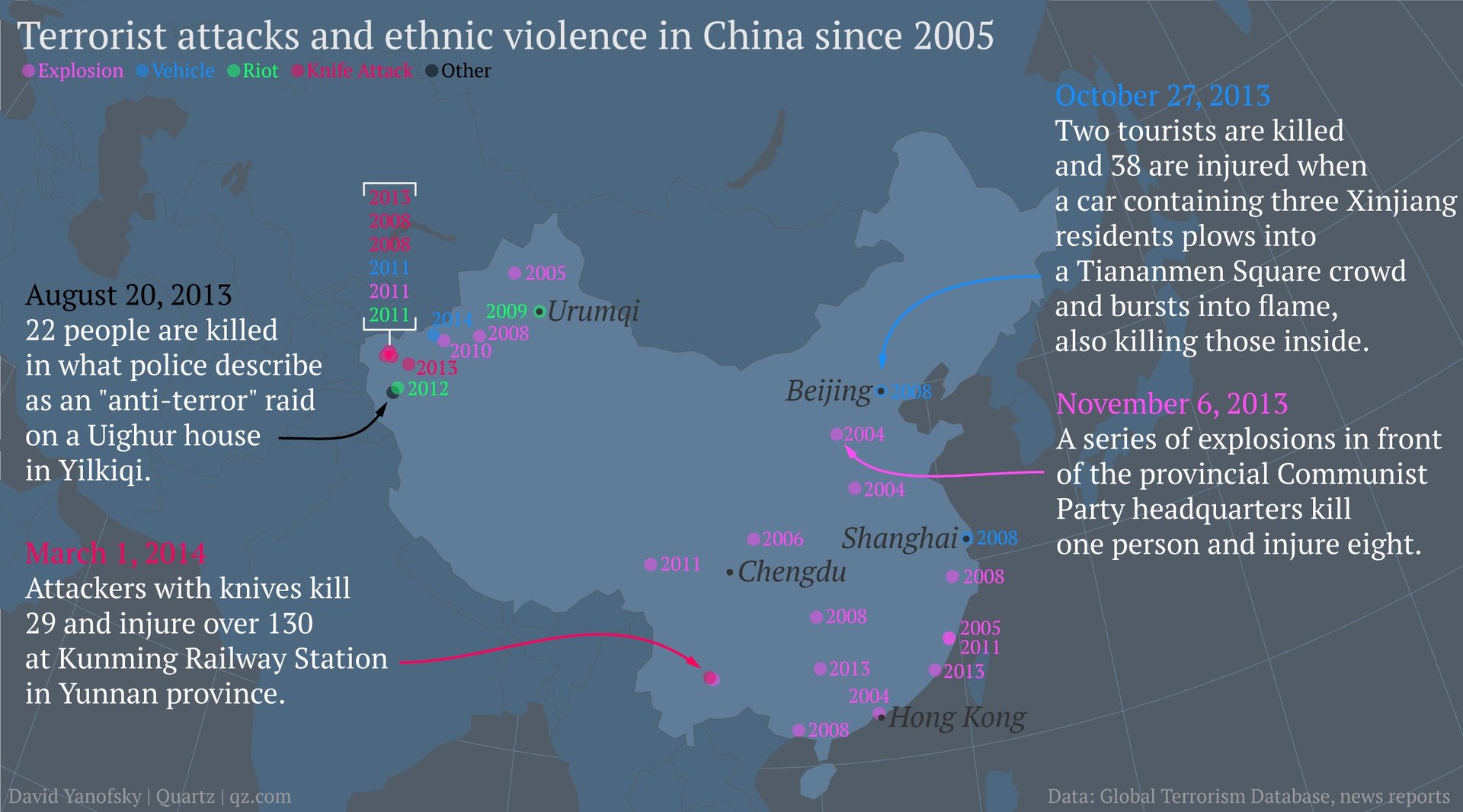China’s bloody train station attack shows how terrorism is spreading out of Xinjiang
A group of black-clad men and women armed with long knives killed dozens and injured more than 130 in a train station in Kunming over the weekend, in the latest in a series of violent attacks in China in recent years.


A group of black-clad men and women armed with long knives killed dozens and injured more than 130 in a train station in Kunming over the weekend, in the latest in a series of violent attacks in China in recent years.
Officials blamed Western China’s Xinjiang Muslim separatists for the attacks, and displayed a banner found at the scene that included the Islamic declaration of faith. But in a stark departure from earlier incidents attributed to the group, it took place far from the Xinjiang, a sign that insurgents are branching out throughout the country in search of soft targets.
Kunming, more than 2,500 miles (4,000 km) from Xinjiang, is the capital of the mountainous, ethnically diverse Yunnan province, without a significant Uighur population of its own. “It shows that Uighurs are, like Chechens in Russia, expressing their discontent throughout the country, not just where they are based,” Dru Gladney, a professor at Pomona College and author of “Muslim Chinese: Ethnic Nationalism in the People’s Republic, told the Los Angeles Times.
A car attack last year in Beijing’s Tiananmen Square was also blamed on the group, but caused much less damage. If the Uighurs are actually responsible for this weekend’s attacks, “it is without question an escalation,” Magnus Ranstorp, a counter-terrorism expert at the Swedish National Defence College, told The Guardian. “There hasn’t been anything on this scale, as far as I have seen.”
Tensions in resource-rich Western China have been escalating for years, as Han Chinese emigrate to the region, in many cases taking the best jobs while locals, especially those who don’t speak Mandarin, face widespread poverty and growing unemployment. The Chinese government has clashed with Xinjiang citizens many times in recent months, resulting in dozens of deaths, and six weeks ago authorities detained the group’s best-known moderate voice, economics professor Ilham Tohti. He was recently charged with “inciting separatism,” a charge his lawyer and wife deny.
But international terrorism experts and influential Chinese commentators believe China’s policies in the Western region are just one factor contributing to rising terrorist activity like this weekend’s attack. China’s economic rise, and particularly its growing reach in the Middle East and North Africa, areas contested by extremist Islamic jihadi organizations, could also be fueling terrorism inside the country itself. Philip B. K. Potter, an assistant professor of public policy and political science at the University of Michigan, explains why:
Where China was once viewed as a patron of liberation movements (including those active in Palestine) and a counterbalance to the United States and the Soviet Union, current jihadist propaganda characterizes it as inheriting the designation of “head of the snake” from the United States…China’s ongoing security crackdown in Xinjiang has forced the most militant Uyghur separatists into volatile neighboring countries, such as Pakistan, where they are forging strategic alliances with, and even leading, jihadist factions affiliated with al-Qaeda and the Taliban.
Not surprisingly, the attacks provoked nationwide alarm. State news agencies dubbed them “China’s 9/11” and said the country needs to establish anti-terrorism plans (link in Chinese) in cities around the country, perhaps molded on American “neighborhood watches.”
Jennifer Chiu contributed reporting.